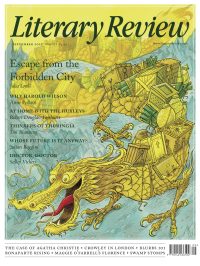Daisy Dunn
Statues of Limitations
Exposed: The Greek and Roman Body
By Caroline Vout
Profile 432pp £25
Circe was the sorceress who transformed men into swine in Homer’s Odyssey. Fast-forward seven hundred years or so and in Ovid’s Metamorphoses she is back to her old tricks, her target this time a young nymph named Scylla who has won the heart of a sea god, Glaucus, with whom Circe has fallen in love. Scylla is bathing when she looks down at her body to find a family of terrifying doglike creatures suddenly emerging from her loins. She tries to flee, but the beasts have become part of her.
Classical myths have often been taken as allegorical. Scylla is afraid of her changing body because she is afraid of growing up. ‘The scenario is extreme,’ explains Caroline Vout, a professor specialising in classical art at Cambridge, ‘but her reaction is one that is common to teenagers everywhere, many of whom struggle to come to terms with their swelling sex organs, sprouting pubic hair and body odour.’
Vout had initially intended to write a book on either ancient faces or on sexuality; the myth of Scylla would certainly have lent itself well to the latter. Instead, she has tackled the ancient body in its entirety, drawing frequent parallels between the Greek, the Roman and the contemporary. She describes her resulting work as ‘less a biography of the Greek and Roman body, its birth, growth, death, afterlife (though there is a bit of that), than a scenography in nine acts that puts the human body into a series of performative contexts’. Even after reading the book, I struggle to say what this means, but would hazard a guess that it relates in part to its stubbornly unchronological structure.
Vout moves seamlessly between the sculptors of fifth-century-BC Athens and 18th-century draughtsmen, exploring in the process many splendid works I had never seen before. Turning the pages of her book is visually exciting. One moment we are presented with an exquisite bronze bust of a young boy identified

Sign Up to our newsletter
Receive free articles, highlights from the archive, news, details of prizes, and much more.@Lit_Review
Follow Literary Review on Twitter
Twitter Feed
It wasn’t until 1825 that Pepys’s diary became available for the first time. How it was eventually decrypted and published is a story of subterfuge and duplicity.
Kate Loveman tells the tale.
Kate Loveman - Publishing Pepys
Kate Loveman: Publishing Pepys
literaryreview.co.uk
Arthur Christopher Benson was a pillar of the Edwardian establishment. He was supremely well connected. As his newly published diaries reveal, he was also riotously indiscreet.
Piers Brendon compares Benson’s journals to others from the 20th century.
Piers Brendon - Land of Dopes & Tories
Piers Brendon: Land of Dopes & Tories - The Benson Diaries: Selections from the Diary of Arthur Christopher Benson by Eamon Duffy & Ronald Hyam (edd)
literaryreview.co.uk
Of the siblings Gwen and Augustus John, it is Augustus who has commanded most attention from collectors and connoisseurs.
Was he really the finer artist, asks Tanya Harrod, or is it time Gwen emerged from her brother’s shadow?
Tanya Harrod - Cut from the Same Canvas
Tanya Harrod: Cut from the Same Canvas - Artists, Siblings, Visionaries: The Lives and Loves of Gwen and Augustus John by Judith Mackrell
literaryreview.co.uk